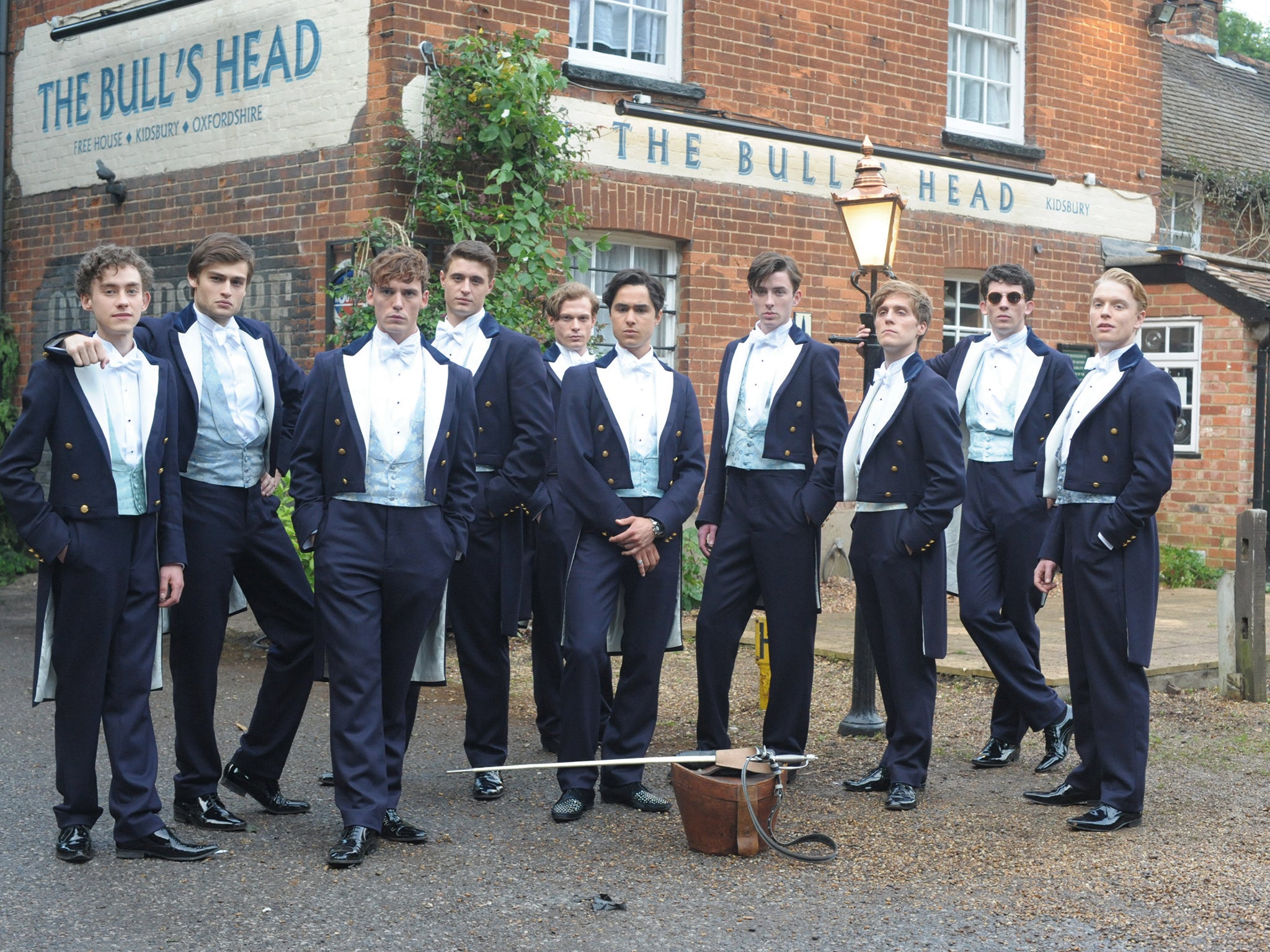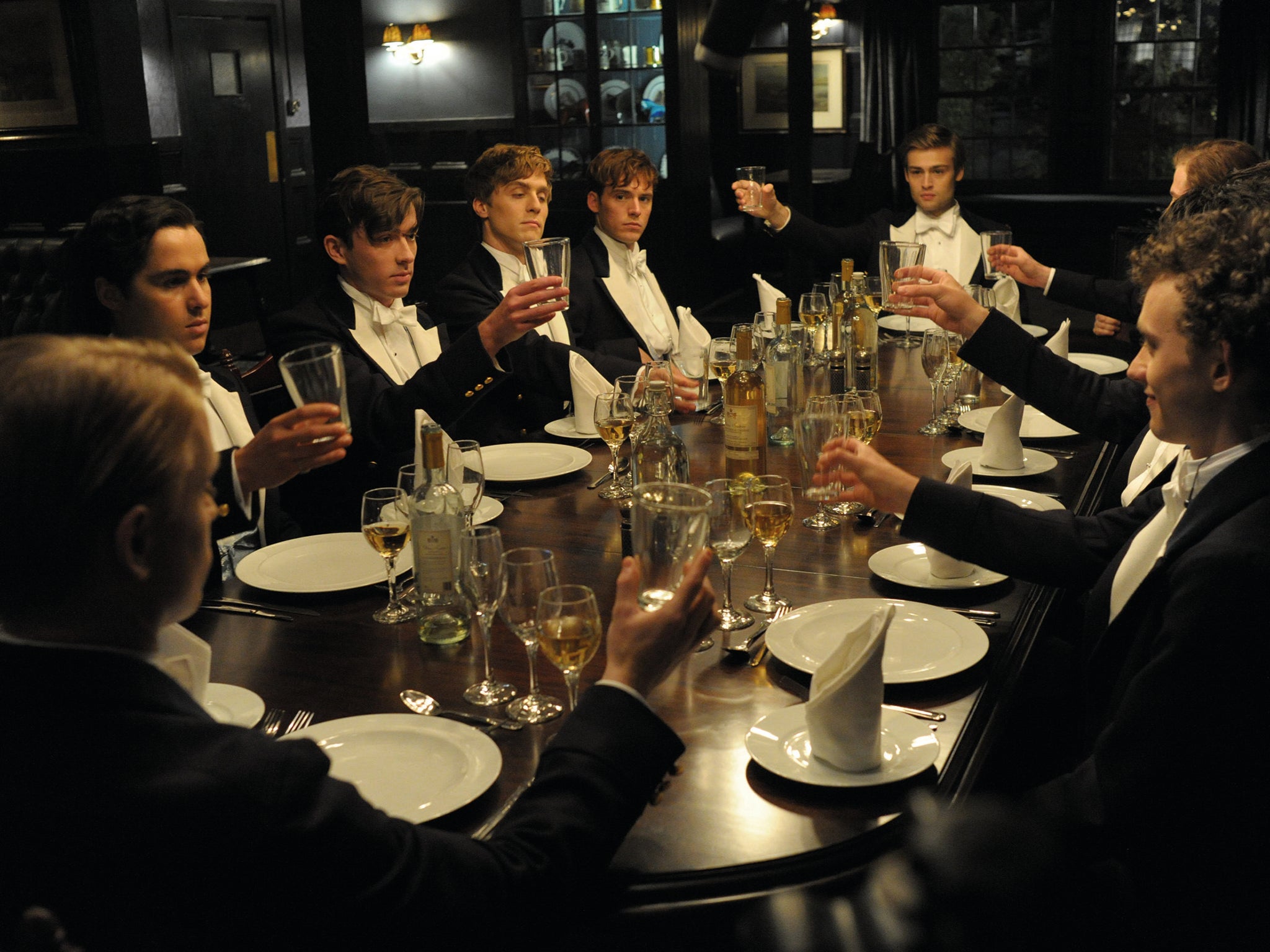The Riot Club film: Tories need not worry about adaption of the Bullingdon Club, says director
Director says characters are not based on modern politicians

Your support helps us to tell the story
From reproductive rights to climate change to Big Tech, The Independent is on the ground when the story is developing. Whether it's investigating the financials of Elon Musk's pro-Trump PAC or producing our latest documentary, 'The A Word', which shines a light on the American women fighting for reproductive rights, we know how important it is to parse out the facts from the messaging.
At such a critical moment in US history, we need reporters on the ground. Your donation allows us to keep sending journalists to speak to both sides of the story.
The Independent is trusted by Americans across the entire political spectrum. And unlike many other quality news outlets, we choose not to lock Americans out of our reporting and analysis with paywalls. We believe quality journalism should be available to everyone, paid for by those who can afford it.
Your support makes all the difference.Laura Wade's play ‘Posh’ caused a sensation when it debuted at the Royal Court Theatre in 2010, in the run-up to the last General Election.
It told the story of a dinner at the Riot Club, an exclusive Oxford undergraduate dining society specialising in debauchery, alcohol-fuelled hedonism and ostentatious displays of wealth.
Immediately, comparisons were made between the fictitious club and the Bullingdon Club, of which Prime Minister David Cameron, Chancellor George Osborne and the Mayor of London, Boris Johnson, were all members.
The meeting of 10 Oxford students starts off pleasantly enough, before alcohol starts taking hold and friendly banter becomes violence and destruction. The idea that Posh was a comment on the current leaders of the Conservative Party was reinforced when the play transferred to the West End in 2012 and the script updated to include references to the coalition government.
The Toronto International Film Festival saw the play given the big–screen treatment. The title has been changed from Posh to The Riot Club, which, although possibly catering a little more to international audiences, is something of a misnomer in that the screen adaptation actually includes a whole new first act that starts off in freshers’ week, introduces Lauren (Holliday Grainger), a new female working-class character who dates fellow fresher Miles (Max Irons). The changes are aimed at making the story more accessible to international audiences, and as part of this process the links made to the current government are lessened.

The director, Lone Scherfig, says: “Laura’s play is inspired by the Bullingdon Club but you won’t recognise any contemporary politicians in my film.” That hasn’t stopped politicians complaining about the adaptation, though. When it was announced that the movie would receive £1m of funding from the British Film Institute, the Tory MP Lee Scott argued: “I have to question the timing and motive in awarding Lottery money for what looks like a politically biased film to be released on the eve of the next general election.”
A fellow Conservative MP, Angie Bray, added: “This looks like revenge for George Osborne cutting film-festival subsidies.”
But as Scherfig recently argued at the Toronto Film Festival, this was a case of criticising a piece of art before actually seeing it.
Bray and Scott needn’t have worried, as the director’s motivation to adapt the play were entirely different, and slightly more mundane: “I went to see the play twice, and the second time I saw it I thought, ‘if anyone is going to film this, I would really like to be asked’. At the same time, Laura Wade had told the producer, who had just bought the rights, that I was on the top of her list of who she wanted to direct the film.”

Watch Apple TV+ free for 7 days
New subscribers only. £8.99/mo. after free trial. Plan auto-renews until cancelled

Watch Apple TV+ free for 7 days
New subscribers only. £8.99/mo. after free trial. Plan auto-renews until cancelled
What is perfect about this story is that one of the tenets of the play is that high-class society and aristocracy relies on who, rather than what, you know to function and survive. It so happens that the producer on The Riot Club is Peter Czernin, who was a flatmate of David Cameron after being at Eton together.

The other less nepotic reasoning and the one that Scherfig wants to tout is that serendipity meant that she had become one of the world’s most sought-after directors at the very moment Wade’s play arrived in theatres. In 2009, the Copenhagen-born director’s An Education premiered at Sundance, and the film went on to receive a Best Picture Academy Award nomination, while Scherfig was nominated for a Best Director Bafta for the adaptation of Lynn Barber’s memoir. Like Posh, the film dealt with class, white-collar crime and a protagonist who dreamt of life at Oxford University, making a star out of Carey Mulligan along the way. Scherfig followed this up, in 2011, with the adaptation of David Nicholls’s best-selling book One Day, which deals with a couple who meet and fall in lust at Edinburgh University.
“It must have been those films, because I don’t think she saw some of my earlier Danish films,” says the 55-year-old director. Scherfig made four Danish films earlier on in her career, Italian for Beginners (2000) and Just Like Home (2007). The former was made under the auspices of the Dogme 95 rules, from the film-makers’ club invented by Lars von Trier, in which directors had to adhere to 10 commandments of film-making, as decreed by him. It sounds like a directive from The Riot Club. What is intriguing is that four of the eight films Scherfig has made to date take place in Britain. Her love affair started in 2002 with the Glasgow-set drama Wilbur Wants to Kill Himself. Her last three films have been An Education, One Day and The Riot Club.
“I’m not necessarily fascinated by the British aristocracy but by the class system,” says Scherfig. “For instance, some of the art that you see hanging on the walls of the places where these people live is so beautiful. I would read about what Camilla Parker Bowles wears this week. I would buy a tartan bedspread because it looks like [it’s from] those places.
“Yet it’s the middle class, which is represented by the pub owner in the film... he too is impressed with these boys, and lets them get away with quite a lot. That is one of the very interesting elements about this film – it’s not just either that you are super-elite born and bred, the absolute top upper class in England, or you are sitting in the gutter. There’s a big group in the middle where the class system also influences everything.”
Rather than put her off Oxford University, making the film has only added to Scherfig’s admiration. “I think if I had known what I know about Oxford now when I was 18 I would have done everything I could to get in,” she says. “It is wonderful, the amount of knowledge, and there are so few students.”

Scherfig says the new characters and additional sequence were made by the playwright, adding: “It was Laura’s decision. I think she just wanted to add a bit more back-story. Also it works so you can understand the film even if you don’t have the knowledge about [the] British upper class that the British people do.”
Early on the decision was made to recast the actors from the play. It adds to the sense of the film being a separate entity and allowed the director to cast some of the most prominent young actors in Britain. Scherfig explains: “One person from the original cast is in the film, Tom Mison, who opens the film with his speech for Lord Riot. The play has been staged a few times, but we felt it would do most justice to everyone, completely new actors, to start from scratch.”
“Maybe I can just full-on adore these young gentlemen because I’m not a man, I’m not young. I can genuinely enjoy seeing how they find new facets of their craft in front of the camera as it’s rolling. That they conquer new emotional landscapes was the best part of this. They are so much nicer in reality than in the film.”
But the big secret to understanding the film may have nothing to do with its British sensibility: “Laura Wade said if she was going to define the genre of this film it’s a vampire film. The motto should be, ‘don’t feed them after midnight’.”
‘The Riot Club’ is out on Friday
Join our commenting forum
Join thought-provoking conversations, follow other Independent readers and see their replies
Comments